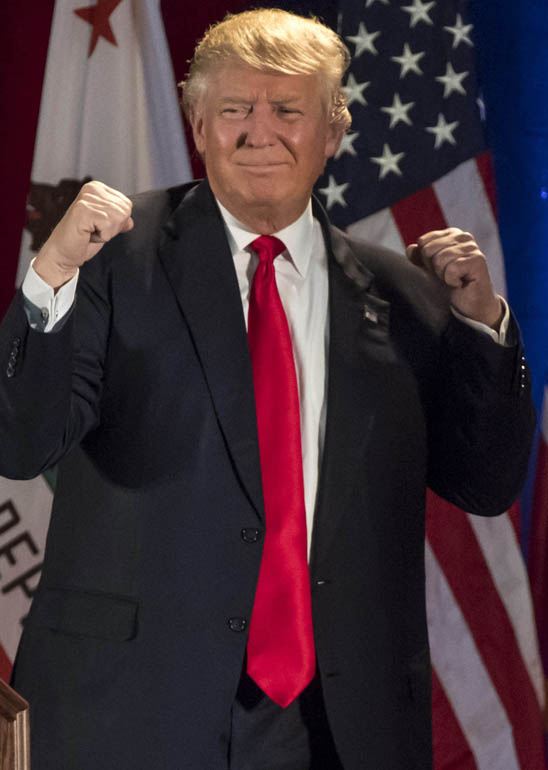 David Paul Morris/Bloomberg
David Paul Morris/Bloomberg
Never in history have more people predicted a leading presidential candidate would quit the race, and never have more people been wrong. As Donald Trump wraps up his final days of frenzied campaigning, and voters go the polls, it's worth noting how many times over the past two years there were people who said this day would never come.
First, of course, there was a near-consensus among the commentariat in the spring of 2015 that Trump, despite having hired a top operative in Iowa and having spent more time in that first-voting state than some high-profile candidates, would never actually run. The denials that Trump would get in the race continued almost to the moment, on June 18, 2015, that Trump formally announced his candidacy.
With that began the reports, speculation, and predictions that Trump would drop out.
It started slowly, and a little tentatively. On July 13, 2015, Atlantic's James Fallows published "Three Truths About Trump," the second of which was that he would quit the race. "We know what will happen -- that Trump will drop out -- even though we don't know exactly when," Fallows wrote. "Everyone knows, for certain, that he will fade as the novelty of his histrionic act gets old."
"There is a fair-to-good chance Trump will drop out or cease active campaigning at some point," said University of Virginia political guru Larry Sabato on July 15.
On Aug. 20, Stuart Stevens, a top Mitt Romney aide in the 2012 campaign, wrote a piece for the Daily Beast headlined, "Why Trump Will Never Make the Ballot," predicting Trump would drop out before the first vote was cast in the Republican nominating campaign. Trump was destined to lose when voting began, Stevens wrote, so therefore he would drop out before that happened. "Donald Trump believes losing makes you a loser," Stevens declared. "And he will do anything to avoid that label."
"My latest sit-down with Donald Trump and his surprising comments about what it would take for him to drop out," teased Chuck Todd on "Meet the Press" on Oct. 4. 2015, Trump said pretty much the same thing to Todd that he had said to Harwood, leading to interview after interview in which Trump was asked if he would drop out.
"No, no, I'm not getting out," an exasperated-sounding Trump told CNN a short time later. "I'm not going anywhere. I'm leading every poll. I'm leading every state. I'm not going anywhere."
But the talk went on. As January 2016 arrived, looking ahead to the Feb. 1 Iowa caucuses, Chuck Todd was back at it, with another Trump interview.
"You know there's this running conventional wisdom about you with some in the establishment that now say, OK, he's here to stay but if he doesn't win Iowa, he'll leave the race."
"No, I'm not leaving," Trump answered. "No, I'm not leaving."
Trump, of course, did not win Iowa, finishing in second place to Ted Cruz. But he didn't leave.
Talk of Trump quitting would flare periodically for the next few months. It settled down a bit when Trump captured the nomination with a win in the Indiana primary on May 3. But it was back before Trump went to Cleveland for the Republican Convention, which began July 18.
On July 7, the New York Times published perhaps the weirdest scenario yet: Trump would finish the campaign, win the White House, and then quit. The headline was, "Would Donald Trump Quit if He Wins the Election? He doesn't Rule It Out."
The Democratic Convention immediately followed the GOP gathering, and brought with it the Khizr Khan controversy, which prompted a new round of Trump-quits talk. On Aug. 3, ABC ran a story headlined, "Senior GOP Officials Exploring Options if Trump Drops Out." The story said top Republicans were "so frustrated -- and confused -- by Donald Trump's erratic behavior that they are exploring how to replace him on the ballot if he drops out."
Just like he didn't drop out before, before, Trump didn't drop out.
On Oct. 7, the Washington Post published the Access Hollywood video. Some Republicans, who had up to that point stayed at least nominally in Trump's camp, ran away. There were calls for him to drop out. On Oct. 8, Trump tweeted: "The media and establishment want me out of the race so badly -- I WILL NEVER DROP OUT OF THE RACE, WILL NEVER LET MY SUPPORTERS DOWN!"
Indeed, Trump didn't drop out. And come Election Day, Trump's name was still on the ballot.
So there was wishful thinking about Trump dropping out when he was leading the primary polls, and there was wishful thinking about him dropping out when he was far behind in the general election polls.
Perhaps that is just what human beings do. Many people, journalists included, believed a Trump candidacy, much less a Trump presidency, would be a dreadful scenario. And when confronted with a dreadful scenario, people often just wish it would somehow go away. That's what they did with Trump.
Now, ironically, some of the same people are no longer worried that Trump will quit, but that he will not quit. There's speculation and guessing that if Trump loses, he will not accept defeat, and will go on campaigning, rallying his supporters to oppose and undermine Hillary Clinton. No one other than Trump can say precisely what he will do, but the latest predictions might be no more accurate than the older ones.
The bottom line is, over many long months, the political system occasionally lost its collective head over Trump, imagining all sorts of wild scenarios. No matter who wins on election night, that seems unlikely to change.


 Contact The Editor
Contact The Editor
 Articles By This Author
Articles By This Author